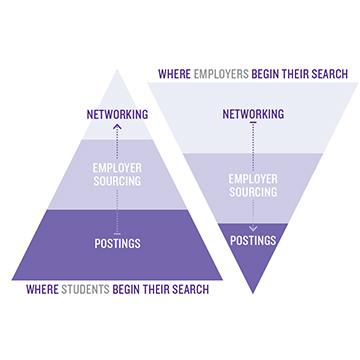Search for Opportunities
Hiring Cycles for Advanced Degree Applicants
One of the most challenging things about the search is that there are very few industries that have dedicated hiring cycles for PhDs. A few exceptions are the academic market, a handful of management and strategy consulting firms, and some R&D rotational programs. Moreover, very few advanced degree candidates are looking for a true entry-level role. This means, depending on the industry, things may not be posted before they need to be filled, increasing the need for candidates to be clear on their anticipated end date of their PhD studies or postdoc appointment.
One way to start developing an understanding of different hiring practices and cycles is to include this information in a list of informational interview questions as you approach your end date. Another thing to keep in mind is that not every experienced hire role is posted. Tapping into your network early and often is the best way for your contacts to know when you are looking, the roles you are interested in, and puts you in the best position to be in the right place at the right time. You will constantly hear stories from professionals about how lucky they were, but an immense amount of work goes into facilitating that luck!
Mobilize Your Network
Networking is the most effective search strategy and the one most used by employers. From an employer perspective, networking enables a recruiter to more easily identify high-potential candidates. For PhD students and postdocs seeking experienced hire roles, networking provides an opportunity to develop contacts, learn about specific employers, identify job titles, and exchange information regarding interests and opportunities. Establishing genuine networking relationships is a constant process that should begin well before your job or internship search and continue even after you secure a position.
How your network can support you:
- When you find an opportunity of interest, reach out to your network contacts. Ask if they are aware of the opportunity and have any insight or advice on that particular role.
- Keep in mind: This is an easier ask when you have had a previous conversation. If this is your first outreach to an alum or contact, remember, your urgency is not theirs. Do not put time pressure on their response. Share you are planning to apply but regardless, you would like to find time to connect to learn more about their experience and advice for entering not just their organization but a specific field.
- Keep your network informed of your search and seek their support. Provide quick updates and notes of appreciation to maintain and strengthen your connections.
The Job Search Pyramids
The job search pyramids show the discrepancy between the search methods employers use to identify candidates and those that students and postdocs use in their job and internship searches.
Although a job search is a priority for you, be patient—remember that recruiting is one priority among many for employers.
Employer Sourcing
Employer sourcing involves researching potential companies in your desired industry to target and pursue opportunities. Many employers only post opportunities on their own websites to avoid recruiting too many candidates. To overcome this obstacle and expand the amount of listings you see, you should actively seek out employers of interest.
- Develop a comprehensive list of employers. This should include employers that you already know of and those that surface in your research. When you find employers of interest, also consider their competitors (or use "similar to" features on sites like LinkedIn, Handshake, or Mergent Intellect).
- Visit the website of each employer on your list to learn about current openings. Many websites allow you to save your search; this is a great time-saver as you will need to visit these sites regularly during your search.
- Apply for specific openings on the company’s website. If you find an opportunity, adjust your application materials accordingly and submit your application.
- Think longer term. If there are no current opportunities, network to establish a connection in anticipation of future openings.
